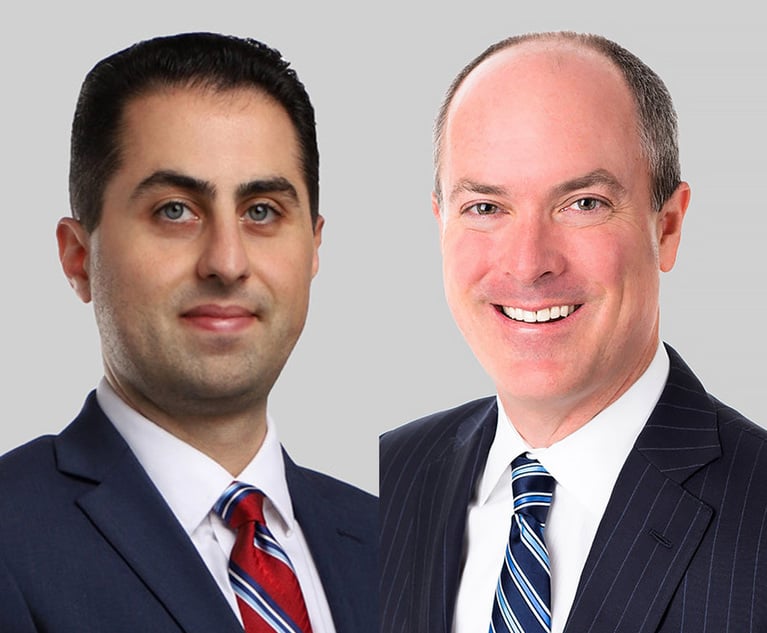 (L-R)Saverio Romeo and Matthew Lee of Fox Rothschild. Courtesy photos
(L-R)Saverio Romeo and Matthew Lee of Fox Rothschild. Courtesy photos Unchargeable Conduct: The Next Frontier for Sentencing Reform
Under the previous rule, a defendant who was convicted of one charge but acquitted of another could still face punishment for the acquitted conduct, so long as the government could convince the judge at sentencing that it was more likely than not that the defendant did in fact commit the crime.
October 30, 2024 at 11:54 AM
3 minute read
In April 2024, the U.S. Sentencing Commission took action to end a controversial practice known as "acquitted conduct" sentencing. Under the previous rule, a defendant who was convicted of one charge but acquitted of another could still face punishment for the acquitted conduct, so long as the government could convince the judge at sentencing that it was more likely than not that the defendant did in fact commit the crime. You read that right—the old rule meant that "not guilty" at trial did not always mean "not guilty" when it came time for sentencing. The commission has rightfully done away with this practice, at least at the federal level.
But what about a case in which a defendant is facing increased punishment at sentencing for a crime he was never charged with? What about a situation where the defendant legally could not even be charged with that crime in the first place? It happens more than you might think. Take for instance the following scenario. A defendant pleads guilty to a fraud crime. The plea agreement contains numerous stipulations but leaves space for the government to argue about the defendant's "relevant conduct" at sentencing. As sentencing approaches, the government informs the parties that it has conducted an investigation and unearthed new evidence that the defendant not only committed fraud, but also intimidated a witness a number of years prior in an attempt to conceal the fraud. The defendant was not charged with witness intimidation, nor could he be given that the statute of limitations ran out long ago. Common sense might dictate that the defendant should not be subject to punishment for that unadjudicated conduct. But in reality, the prosecution may have lucked out. The government faces a much lower burden of proof and virtually no evidentiary hurdles at sentencing.
NOT FOR REPRINT
© 2025 ALM Global, LLC, All Rights Reserved. Request academic re-use from www.copyright.com. All other uses, submit a request to [email protected]. For more information visit Asset & Logo Licensing.
You Might Like
View All
Former Sacks Weston Partner Faces 5-Year Suspension Over Mail, Wire Fraud Conviction
4 minute read
A Client Is Guilty; But Another Man Is Wrongfully Convicted

GC Pleads Guilty to Embezzling $7.4 Million From 3 Banks
Law Firms Mentioned
Trending Stories
Who Got The Work
J. Brugh Lower of Gibbons has entered an appearance for industrial equipment supplier Devco Corporation in a pending trademark infringement lawsuit. The suit, accusing the defendant of selling knock-off Graco products, was filed Dec. 18 in New Jersey District Court by Rivkin Radler on behalf of Graco Inc. and Graco Minnesota. The case, assigned to U.S. District Judge Zahid N. Quraishi, is 3:24-cv-11294, Graco Inc. et al v. Devco Corporation.
Who Got The Work
Rebecca Maller-Stein and Kent A. Yalowitz of Arnold & Porter Kaye Scholer have entered their appearances for Hanaco Venture Capital and its executives, Lior Prosor and David Frankel, in a pending securities lawsuit. The action, filed on Dec. 24 in New York Southern District Court by Zell, Aron & Co. on behalf of Goldeneye Advisors, accuses the defendants of negligently and fraudulently managing the plaintiff's $1 million investment. The case, assigned to U.S. District Judge Vernon S. Broderick, is 1:24-cv-09918, Goldeneye Advisors, LLC v. Hanaco Venture Capital, Ltd. et al.
Who Got The Work
Attorneys from A&O Shearman has stepped in as defense counsel for Toronto-Dominion Bank and other defendants in a pending securities class action. The suit, filed Dec. 11 in New York Southern District Court by Bleichmar Fonti & Auld, accuses the defendants of concealing the bank's 'pervasive' deficiencies in regards to its compliance with the Bank Secrecy Act and the quality of its anti-money laundering controls. The case, assigned to U.S. District Judge Arun Subramanian, is 1:24-cv-09445, Gonzalez v. The Toronto-Dominion Bank et al.
Who Got The Work
Crown Castle International, a Pennsylvania company providing shared communications infrastructure, has turned to Luke D. Wolf of Gordon Rees Scully Mansukhani to fend off a pending breach-of-contract lawsuit. The court action, filed Nov. 25 in Michigan Eastern District Court by Hooper Hathaway PC on behalf of The Town Residences LLC, accuses Crown Castle of failing to transfer approximately $30,000 in utility payments from T-Mobile in breach of a roof-top lease and assignment agreement. The case, assigned to U.S. District Judge Susan K. Declercq, is 2:24-cv-13131, The Town Residences LLC v. T-Mobile US, Inc. et al.
Who Got The Work
Wilfred P. Coronato and Daniel M. Schwartz of McCarter & English have stepped in as defense counsel to Electrolux Home Products Inc. in a pending product liability lawsuit. The court action, filed Nov. 26 in New York Eastern District Court by Poulos Lopiccolo PC and Nagel Rice LLP on behalf of David Stern, alleges that the defendant's refrigerators’ drawers and shelving repeatedly break and fall apart within months after purchase. The case, assigned to U.S. District Judge Joan M. Azrack, is 2:24-cv-08204, Stern v. Electrolux Home Products, Inc.
Featured Firms
Law Offices of Gary Martin Hays & Associates, P.C.
(470) 294-1674
Law Offices of Mark E. Salomone
(857) 444-6468
Smith & Hassler
(713) 739-1250






